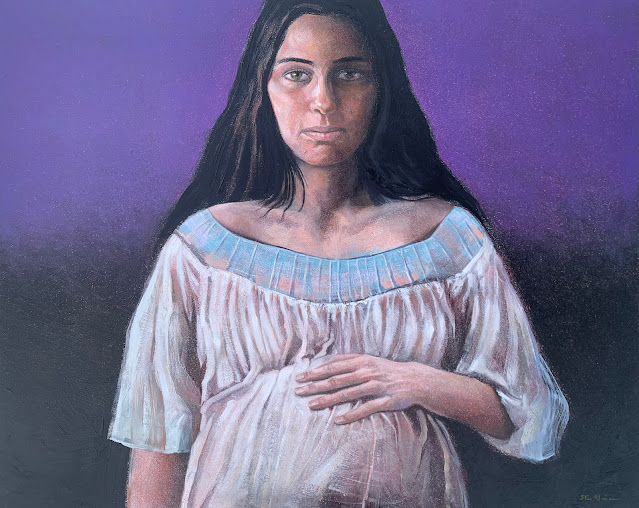The Ballad (Curse) of Betsy Publicover
Years ago, or in one of those 'time out of mind' nights, on the furthest most easterly point of mainland Nova Scotia , Canso poet and dear friend, June N. Jarvis, told me of a tragic, painful, and sad poem she wrote. It's a poem with vengeance and a curse that starts when a young woman is as they say - led astray by a young man. It's about the days of yore, the sea and all the allegory it represents. It's about a woman's decent into supernatural darkness and the August gales that accompanied her.
This is a familiar story in the sense that it is tied to the very
nature of folklore, yet like all memorable folklore, it still has a powerful resonance to
contemporary times. It entails, a young woman and sex, the passage of
time, fishing commerce, a Canso ship in distress, the loss of Betsy's
seventeen year old daughter to the sea, and the inability to console,
where reparations are like gulls uselessly screeching in a tempest. It
is a tale that is dark and only gets darker as Betsy Publicover reacts
to the hopelessness of the situation and the man that brought it all
down on her.
Portraiture has been said to provide the viewer with an encounter - not just a record of human features. Portraits feed our insatiable need for narrative and our experiences, however light or dark the story may be. In this series of paintings I introduce the two main characters. There is a portrait of the protagonist Betsy Publicover pregnant, seventeen years before the August gales. And another of (Proud) Whitman, a member of the Whitman merchant class that resided in the once great sea port of Canso, Nova Scotia. Who were they really? What did they look like? What were their circumstances? How was Betsy led astray by (Proud) Whitman? The beauty of the poem is in the way it conjures up such questions for the reader as it effortlessly rolls us through the darkness of the tale. It's what June leaves out as much as what she puts in that engages us. It suggests and infers using a traditional poetic approach of rhyme with fourteen stanzas each comprised with four line quatrains throughout the entire poem. There is a haunting witchery to stanza nine where the curse takes us into uncharted psychological waters and we question the transformation of reality through this tragic event.
There's no doubt this poem and the accompanying paintings are rooted in the historical tradition of Romanticism.* However, June's poem asserts that even though something took place in the distant past, it remains to be about, and of the world today.
I am most grateful that June has inspired me with her poem and allowed me to reproduce it here for you dear reader.
- Steven Rhude, Wolfville, NS
*Simone
Labuschagne, my wife, graciously modeled and assumed a studio persona
of Betsy Publicover as we discussed which elements of June's poem to
focus on in order to create a compatible visual portrait of her ballad. Archival photos
from our youth thirty five years ago also assisted me with the portraits of
Betsy Publicover and (Proud) Whitman.
The Ballad of Betsy Publicover
(The Whitman Curse)
Along a curving gravel - bar
Bellow a lofty hill,
The Publicover wharves and sheds
Stood high, and dark, and still.
But as the tide and tempest rose
They soon were all alight;
And filled with fearful Canso folk,
Who waited there all night.
Betsy Publicover (The Wait), oil on masonite, Dyptich, 24" x 50", Steven Rhude
Of all who vainly waited there
Throughout the August gale
None suffered more than Betsy did;
And this is her sad tale.
From blushing youth and innocence
She had been led astray,
And borne a bonnie daughter -
who was seventeen that day.
Betsy Publicover Pregnant, oil on masonite, 24" x 30", Steven Rhude
And Whitman's ship, from Halifax
That girl, returning home,
Was, with her shipmates, one and all,
To perish in the foam.
(Proud) Whitman, oil on masonite, 24" x 30", Steven Rhude
Before the early dawn arose
Those waiting on the shore
Had watched the fruitless flares go up
Until there rose no more.
Tempest, oil on masonite, 24" x 18", Steven Rhude
Proud Whitman spoke to Betsy then;
and her response was wild:
"How dare you try to comfort me?
You, father of my child,
My blessed only daughter
who is in the ocean now:"
He blanched, as with mild laughter
She spoke this awful vow:
Betsy Publicover (The Loss), oil on masonite, 24" x 18", Steven Rhude
"I swear that every Whitman child
Shall die while in its youth!
Your seed shall vanish from the earth."
Her fey voice rang with truth.
Betsy Publicover (The Curse), oil on masonite, 24" x 48", Steven Rhude
Now, you who listen to my tale
May laugh, but as you do,
Be well assured, whatever the cause-
Poor Betsy's words came true.
The Whitman line of men and ships
And commerce died away;
The broken lines of earth and stone
Scarce mark their place today.
On any night of wind and storm
That may in august blow,
Beware of what you may behold
If to that place you go:
For some have seen her pacing there
Her dark hair tumbled free;
And streaming out behind her
As she gazes out to sea.
Along a curving gravel - bar
Below a lofty hill,
Betsy keeps vain vigil there...
And curses the Whitmans' still.
- June N. Jarvis, copyright 2023





.jpg)





Comments
Post a Comment